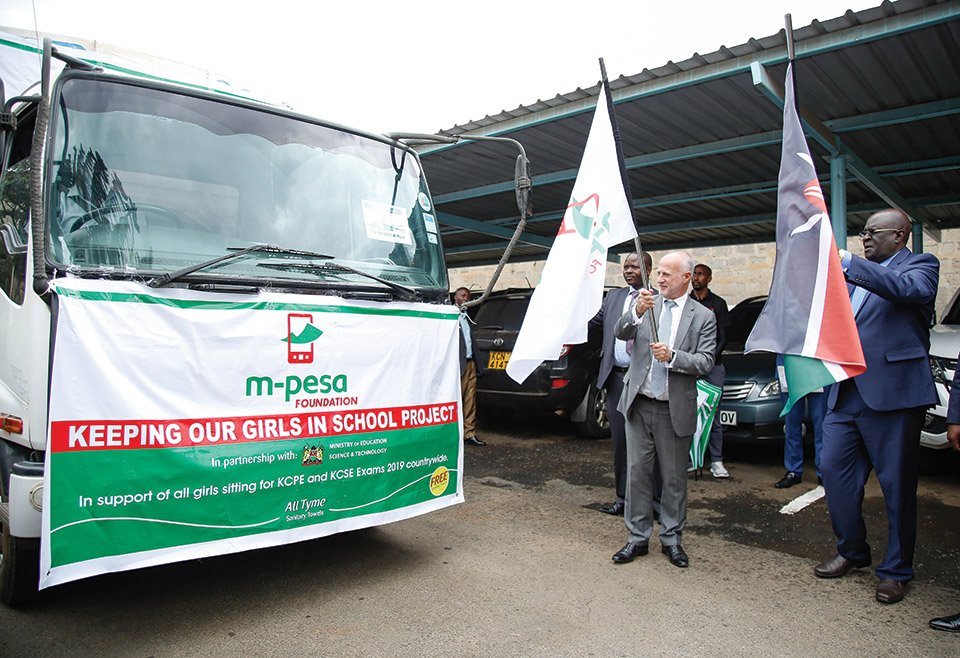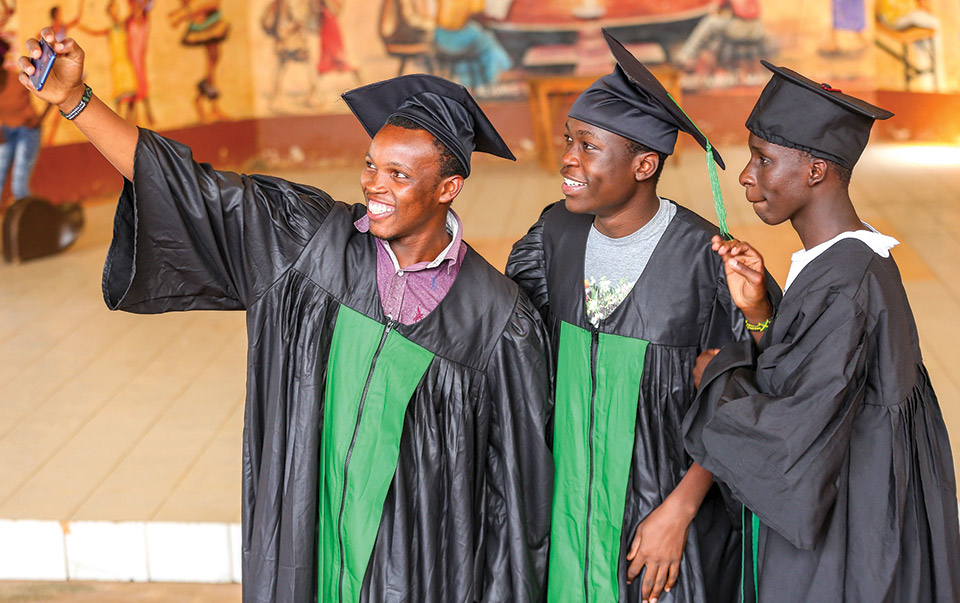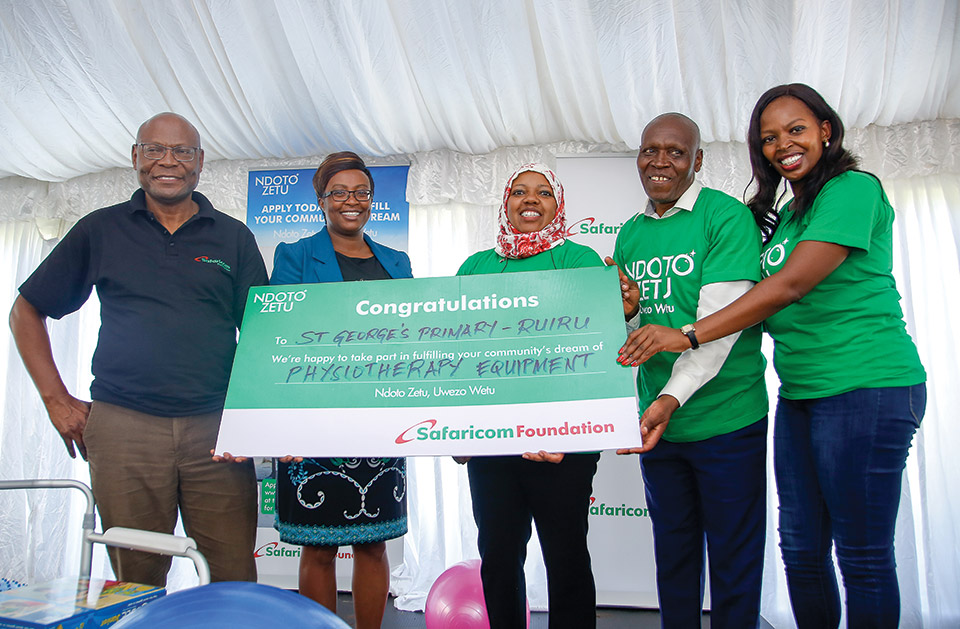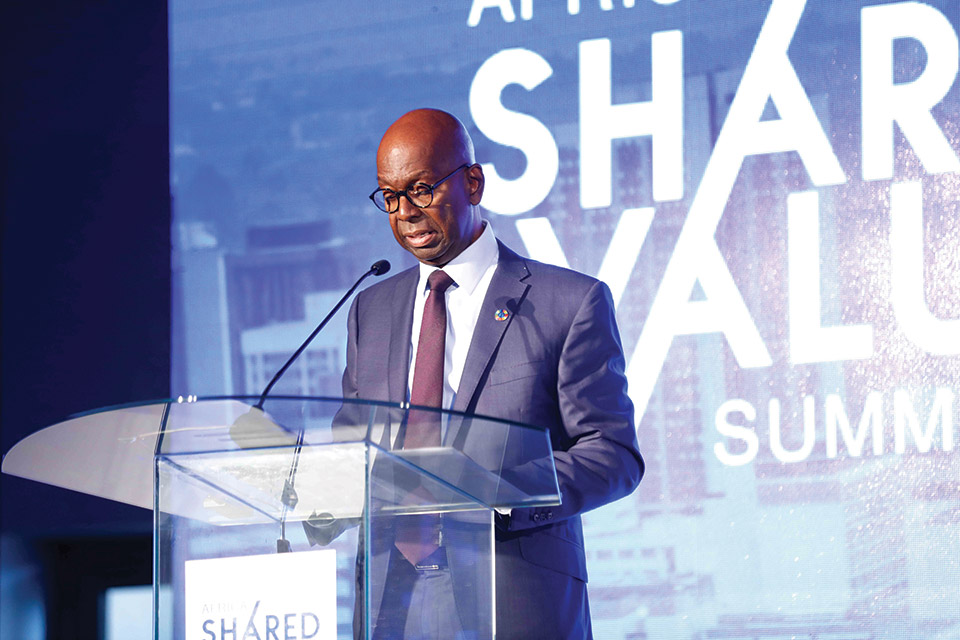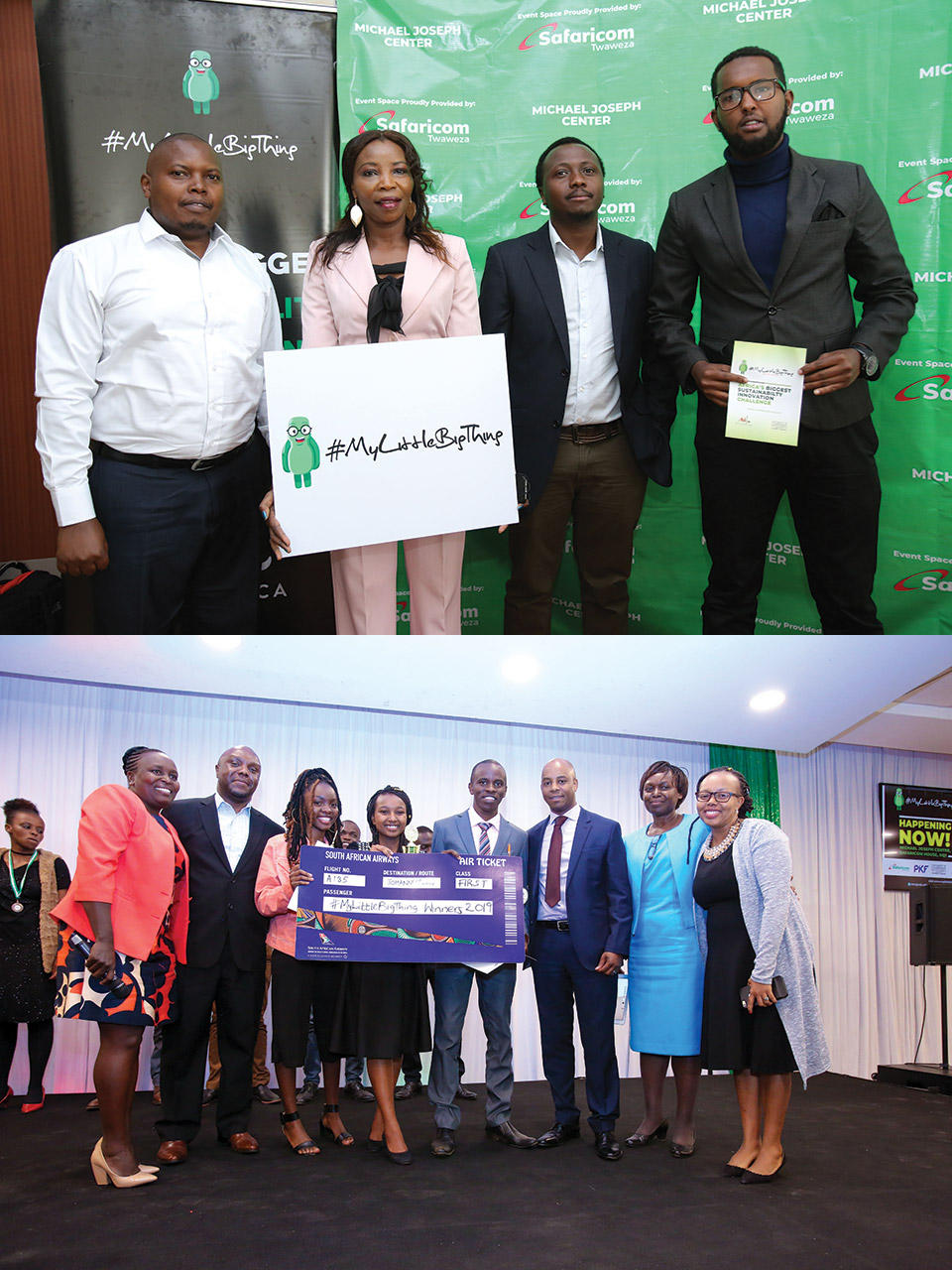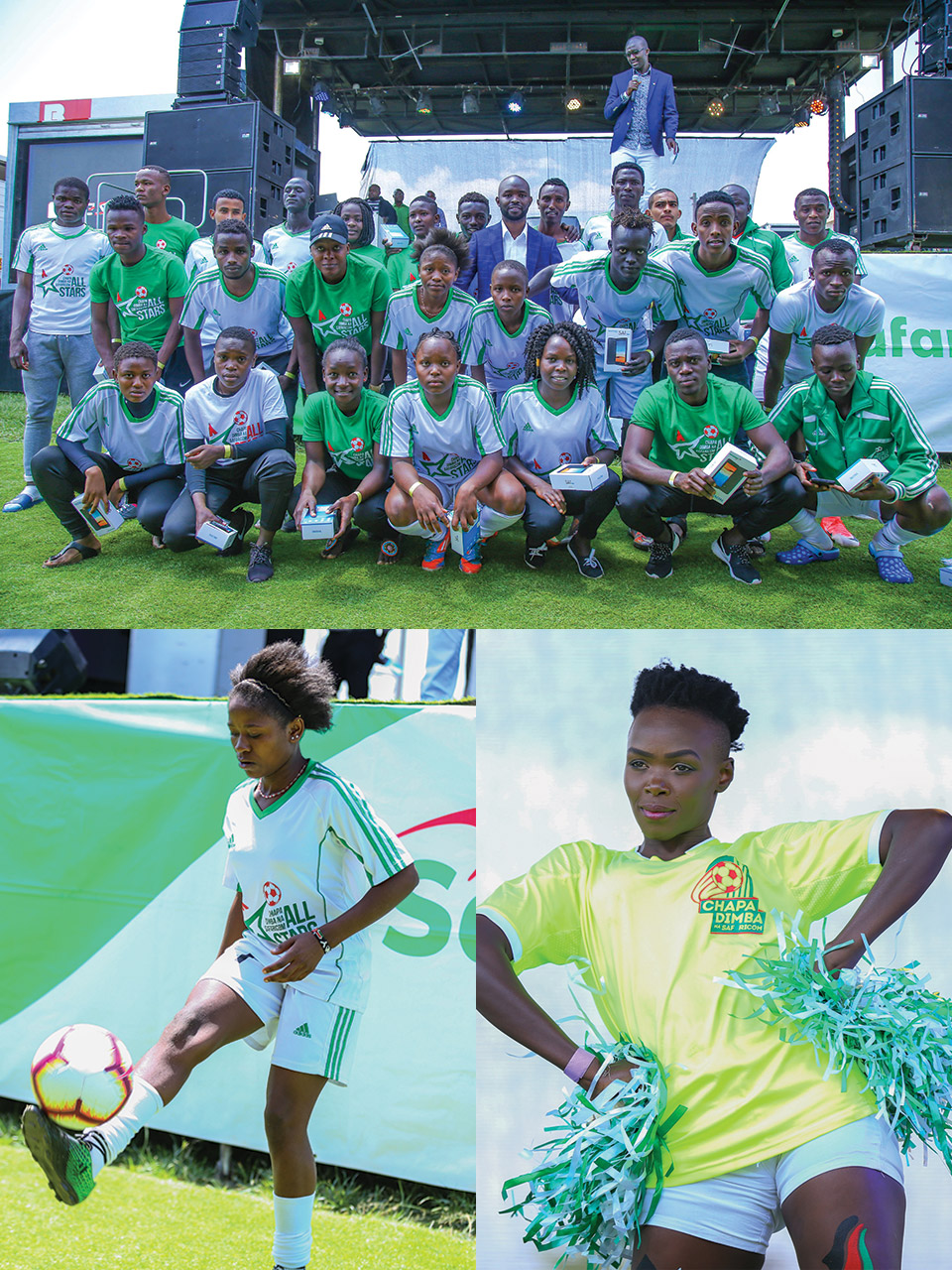Society
![]() Supporting society through COVID-19
Supporting society through COVID-19
- Personal Protective Equipment distributed to 5 300 frontline health workers in 13 counties
- Donated 300 4G capable phones for learners through Dignitas
- Donated 6 water tanks, water kiosks and handwashing points benefiting 27 250
- Airtime for study bundles worth KSh 525 00 donated to 350 learners
- 1 500 food packs with items worth KSh 2 000 distributed to low income households
- Sanitization spray booths erected in 4 counties, benefiting 150 000





The role that we play in society is part of our DNA. We remain committed to ensuring inclusive and equitable quality education and to promoting the life-long educational opportunities for all Kenyans through our foundations and our products and services. We continue to create opportunities for work for our youth, increasing the number of woman in our technology division and through skills development with a focus on digital skills.
We consider our society to be, first and foremost, the Kenyan people, and then the broader regional and global community within which we operate. We take pride in being a responsible corporate citizen and productive member of Kenyan society. We remain committed to working closely with Kenyans to be a respected and empowering contributor to the social and economic development of the country. We acknowledge that the society that surrounds us is an integral part of who we are and what enables our success, providing us with a conducive operating environment, social licence to operate and a market for our products and services.
Safaricom and M-PESA Foundations
Part of our work to transform lives throughout Kenyan society takes place through investment by the Safaricom and M-PESA Foundations. The Safaricom Foundation 2018-2021 strategy is focused on building a stable and inclusive society. The three pillars of the strategy are health, education and empowerment. These pillars are further split into the following programme areas: maternal and child health, non-communicable diseases, technical and vocational training, improving learning outcomes and youth economic empowerment. Since its inception in 2010, the M-PESA Foundation has been keen to partner with Kenyans on large-scale, long-term, highly impactful social projects.
Safaricom Foundation focus areas and beneficiaries

* Percentage of total spend
** Number of lives transformed
Education: Accelerated Learning Programme (Safaricom Foundation)
The Accelerated Learning Programme (ALP) is a partnership between the Safaricom Foundation, the Participatory Action Learning Network and ZiziAfrique to build foundational literacy and numeracy skills in struggling learners rapidly.
The programme targeted children in Standards 4 and 5 in 60 selected schools in Tana River, Turkana and Bungoma. Teachers and assistants underwent six days of training on the teaching method for the ALP, which focuses on play in each lesson and one-on-one coaching for the learners. A maximum of 45 learners are in each class and each class runs for an hour. Song and dance herald the beginning of the lesson, inviting the children into a place of joy while breaking down barriers between teacher and pupil. Students are grouped according to reading ability rather than age.
For a period of ten days, the learners meet each day to focus on learning to recognise a letter, a syllable or a word. Bright and engaging materials that have been specifically developed for each cohort are shared by two students as they motivate each other by vocalising letters and syllables and by tracing words with their fingers. The lessons break for ten days, allowing the children to rest and reflect on learnings, before resuming for another intense 10-day round. This happens three times and the learners attend 30 days of lessons within a 50-day period.
ALP learner, Scovia Waswa from Shidodo Primary School, progressed from reciting from memory to writing and reading her own words on paper in under two months.
Education: Keeping Girls in School Initiative (M-Pesa Foundation)
A 2016 report by FSG, a global consulting firm, showed that only 65 per cent of women and girls in Kenya can afford sanitary towels. Additionally, it is estimated that girls from disadvantaged families miss at least 20 per cent of school days in a year due to lack of sanitary towels, which severely impairs their academic performance and chancesof graduating. Accordingly, more than 800 000 girls sitting for their final year national examinations, including those in Kakuma and Dadaab refugee camps, benefitted from three months’ supply of sanitary towels, courtesy of the M-PESA Foundation. The initiative ensured that no girl would miss sitting for her exams due to lack of sanitary pads.
The M-PESA Foundation worked with local manufacturers to produce the pads, and the Ministry of Education to distribute them, at an estimated cost of KSh 281 million. The girls received a Menstrual Health package, consisting of three packets of sanitary pads (enough to last for three months), three pieces of underwear and a menstrual health information booklet, all enclosed in a drawstring bag.
Education: M-PESA Foundation Academy achieves impressive results
The M-PESA Foundation Academy offers a platform for economically disadvantaged students from across the country, with learners joining in Form One offered full, four-year scholarships. This year the school has admitted 96 students into Form One.
The Academy posted impressive results in its maiden KCSE examinations during the year, achieving a mean grade of B-, with top student Abigael Kadogo emerging 16th nationally and all 91 candidates attaining entry grades to institutions of higher learning. Seven students are also currently studying in the United States after getting fully paid scholarships.
In January 2020, the M-PESA Foundation Academy launched an 11-month post-high school programme for its 91 Form Four leavers. The programme will be hosted at the newly launched Uongozi Center, located inside the Academy, will not only give the students an opportunity to define their career and entrepreneurial choices beyond the Kenya Certificate of Secondary Education (KCSE) examinations, but will also help prepare them for leadership roles in their various interests and sectors.
Empowerment: Wezesha – unlocking the potential of the Kenyan youth
Th Safaricom Foundation has partnered with Generation Kenya and CloudFactory Kenya in a youth unemployment initiative that arms young people with sought-after, highly useful IT skills. Potential candidates undergo a competitive interview proces to secure places on a two-week intensive digital training course run by CloudFactory Kenya. Since January 2019, the Academy has graduated over 600 young people equipped with digital skills that can fast track their entry into jobs and careers, and the Foundation provides funding for laptops as part of the student scholarships.
Health: Afya-Uzazi Salama in Lamu County
The Safaricom Foundation Afya-Uzazi Salama programme is a partnership with PharmAccess Foundation that focuses on improving health service delivery infrastructure, building skills of health workers, enhancing community-based information and education, and health care financing.
Through Afya-Uzazi Salama, eight of the thirteen community health units in Lamu County have been revived. Additionally, 220 community health volunteers (CHVs) have been re-trained on maternal and pregnancy care family planning, data collection, entry, and monitoring. Once dispatched, the volunteers complete their rounds and report findings every month to the community health extension worker (CHEW), who is based at the health facility.
In six months, the minimal reporting rate had increased dramatically to more than 80 per cent, with encouraging results. The communities have benefitted from maternal, newborn and child health services, such as growth monitoring, immunisation, nutrition, family planning, cancer screening and treatment of other conditions that threaten the well-being of the mother and child.
Outreach activities are now conducted countywide, especially in hard-to-reach areas. Most importantly, local dispensaries and hospitals have witnessed increased numbers of patients, all due to the referral system that has been introduced. Sinambio Dispensary in Lamu West, for instance, served 159 women attending antenatal clinics between July and September 2019. Nearly all deliveries now happen at the better equipped Mpeketoni Sub-District Hospital.
Health: Non-Communicable Diseases Programme in Garissa County
The Safaricom Foundation Afya-Uzazi Salama programme is a partnership with PharmAccess Foundation that focuses on improving health service delivery infrastructure, building skills of health workers, enhancing community-based information and education, and health care financing.
Through Afya-Uzazi Salama, eight of the thirteen community health units in Lamu County have been revived. Additionally, 220 community health volunteers (CHVs) have been re-trained on maternal and pregnancy care family planning, data collection, entry, and monitoring. Once dispatched, the volunteers complete their rounds and report findings every month to the community health extension worker (CHEW), who is based at the health facility.
Through this process, Garissa county was identified as having the highest prevalence and was selected as the first county for support. We partnered with the Pastoralist Girls Initiative (PGI) to address the issue in the county. In the first year of the programme, 296 children were enrolled. Children who may have never known what their affliction was until it was too late to save them. The next step was ensuring that the Garissa County Referral Hospital could perform as a beacon of service for these children. Work began in 2019 on the construction of a modern child-friendly diabetes Centre. Over the year 200 children have already learnt the critical skill of self-injecting their insulin, while parents have undergone supportive counselling to empower them with the information to understand the nature of the condition and the ways in which they can support theirchildren through active monitoring an dietary management. Sixty health care workers and a hundred community health volunteers were identified and trained on how to identify, counsel and care for the targeted children.
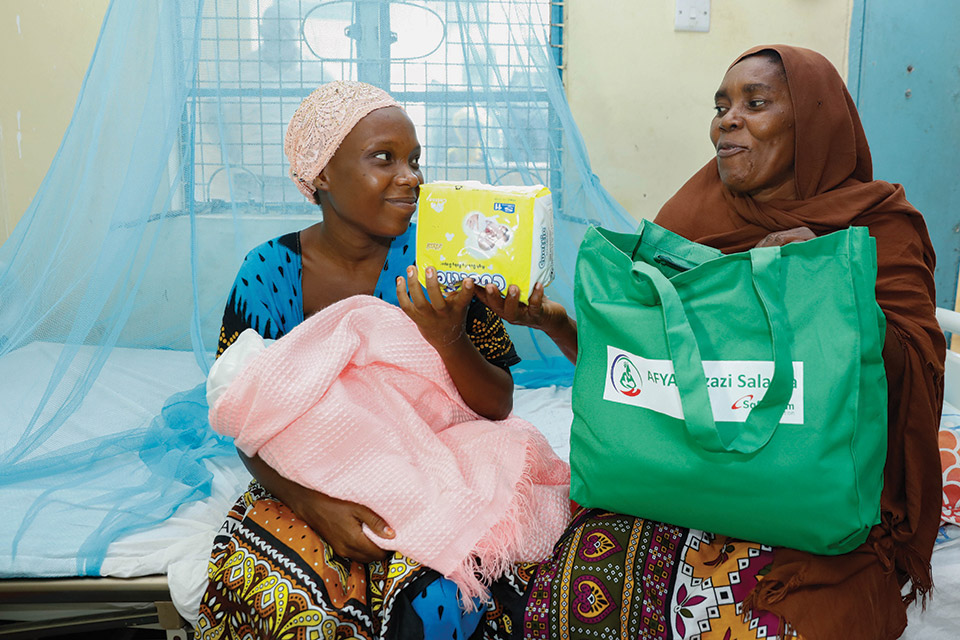
New mother receiving a ‘new mama gift pack’, courtesy of the Safaricom Foundation.
Ndoto Zetu Phase 2
After the tremendous impact and success of the first phase of the Ndoto Zetu (Our Dreams) initiative last year, the Safaricom Foundation launched the second phase of the initiative in February 2020. Ndoto Zetu seeks to support individuals who are keen to make an impact in their communities through social investments. Kenyans who wish to participate in the second phase of Ndoto Zetu are required to nominate community projects that are related to education, health, or economic empowerment. Phase two of the initiative builds on the success achieved in the phase one last year, in which 300 projects across 40 counties positively impacted over 52 000 Kenyans. In Phase 2, we received over 4 000 proposals/requests, of which 328 dreams were selected to be realised and these are projected to transform the lives of more than one million Kenyans.
2019 Africa Shared Value Summit
As part of our commitment to shared value as a way of doing business, we partnered with the Shared Value Africa Initiative (SVAI) to host the 2019 Africa Shared Value Summit on 23 and 24 May 2019. The summit attracted over 300 business leaders, media personalities and other delegates from across the continent. The summit featured various talks by speakers from sectors such as mining, oil and gas, and start-ups from across the continent. We also hosted a group of 50 Kenyan CEOs at a lunch led by our late CEO, Bob Collymore, and Prof. Mark Krammer to discuss ways of enhancing inclusive business and shared value practices in Africa.
“Now, more than ever, there is a clear call to action to business that the business of business can no longer be just business. The Global Goals, the call for more private sector innovation and the call for businesses to develop products and services that address societal needs has been a constant topic in business leadership discussions,” our late CEO, Bob Collymore, addressing delegates at the opening of the Africa Shared Value Summit in Nairobi. Since the Summit, we have joined the SVAI as a member and will continue to champion and advocate for shared value as a growth strategy for business in Kenya.
B-Team
Building on the launch of the Africa regional team in March of 2018, we continued to mobilise business leadership in East Africa during the year, with a focus on advancing open government and responsibility in tax, protecting civic rights, unlocking capital for green business and creating leadership opportunities for women and youth in East Africa.
We held civic rights and tax dialogues at the Mo Ibrahim Governance weekend in April 2019, building upon a series of dialogues that we held in partnership with OXFAM, GSMA and other civil society partners in Kenya and Rwanda in 2018.
Working with the regional members and Safaricom, we have helped raise the standards of corporate tax practicein East Africa and are already seeing a shift in national and regional discourses on the issue.
MyLittleBigThing SDGs Innovation Challenge
We have partnered with MK Africa for the MyLittleBigThing SDGs Innovation challenge since 2017. The challenge is an innovation contest among university and college students, aimed at driving awareness and action on SDGs by developing solutions to the challenges highlighted by the goals.
During the year, we invited entries for innovative solutions to address challenges facing Kenyans as described in the first five SDGs (1-5). The top three ideas win an all expenses trip to attend a week-long sustainability practitioners programme hosted by the University of Cambridge in South Africa.
Over 100 students participated in the challenge, with the winning innovation being Auto-Alcoblow, an alcohol detection and monitoring system created by Stephen Muchiri, who recently graduated from (JKUAT). The system measures the blood alcohol levels of a driver by analysing his or her breath and switches off the ignition of the vehicle if these levels exceed recommended safety guidelines. The system also switches off the vehicle if a driver begins consuming alcohol while driving.
In second place was Ruth Wanjiru, a 22-year old student in her fourth year at JKUAT, whose Power in Plastics project aims to encourage the reuse and recycling of plastics and empower low-income communities.
Nkanai Cynthia, 19, from Kenyatta University placed third, with her Keep A Child Warm project. Using easily available local materials, such as sisal fibre, recycled gunny bags and traditional lesos, Cynthia makes improvised blankets for distribution to street families, whom she also mentors.
Chapa Dimba na Safaricom (Season 3)
We launched Season three of the tournament that seeks to grow and nurture football talent at the grassroots. The all-stars team from season two, comprising of 20 of the most outstanding players from all the regions, participated in a week-long football clinic by La Liga at Barcelona in Spain. Sixteen players from season two have been scouted for inclusion in the national team and various clubs in the national league.
47-in-1 Initiative
Our Technology Division has set itself the target of installing a prefab computer laboratory in at least one primary school in every county in Kenya. Providing young students with early access to digital learning environments and tools makes a huge difiference to their skillsets and future employability and 21 labs have been funded to date. The division had planned to commission another five labs during the year, but a delay caused by the expiry of the PC supplier contract meant that deployment started late in the year and only three labs were completed in Kitui and Kwale Counties before school closures and travel restrictions related to the pandemic were introduced.
![]() Women in Technology (WIT) programmes
Women in Technology (WIT) programmes
Our Women in Technology (WIT) programmes seek to address the issue of fewer women applying to study technology-related subjects at tertiary-level educational institutions and, even earlier, at school. Highlights from the year included:
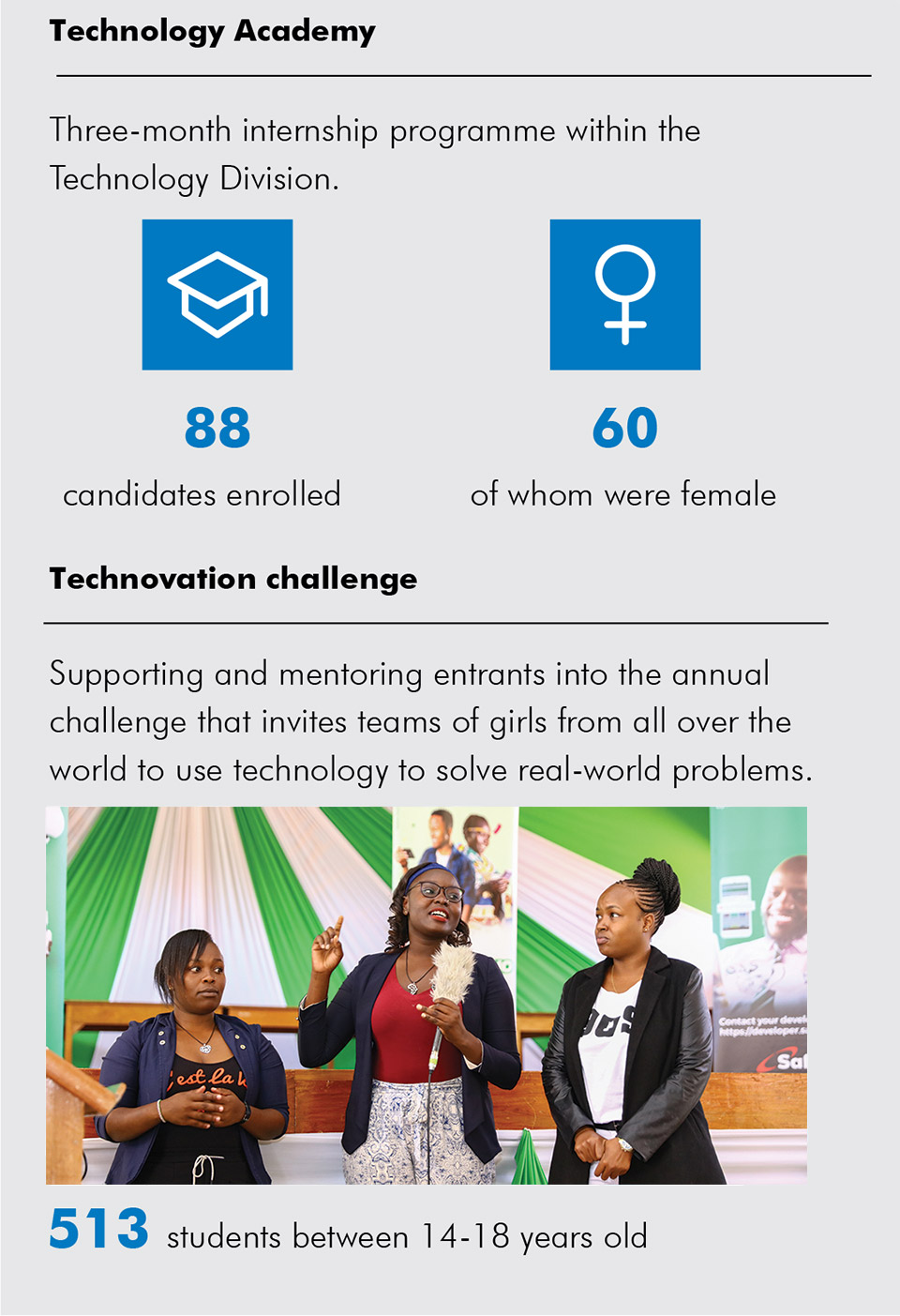
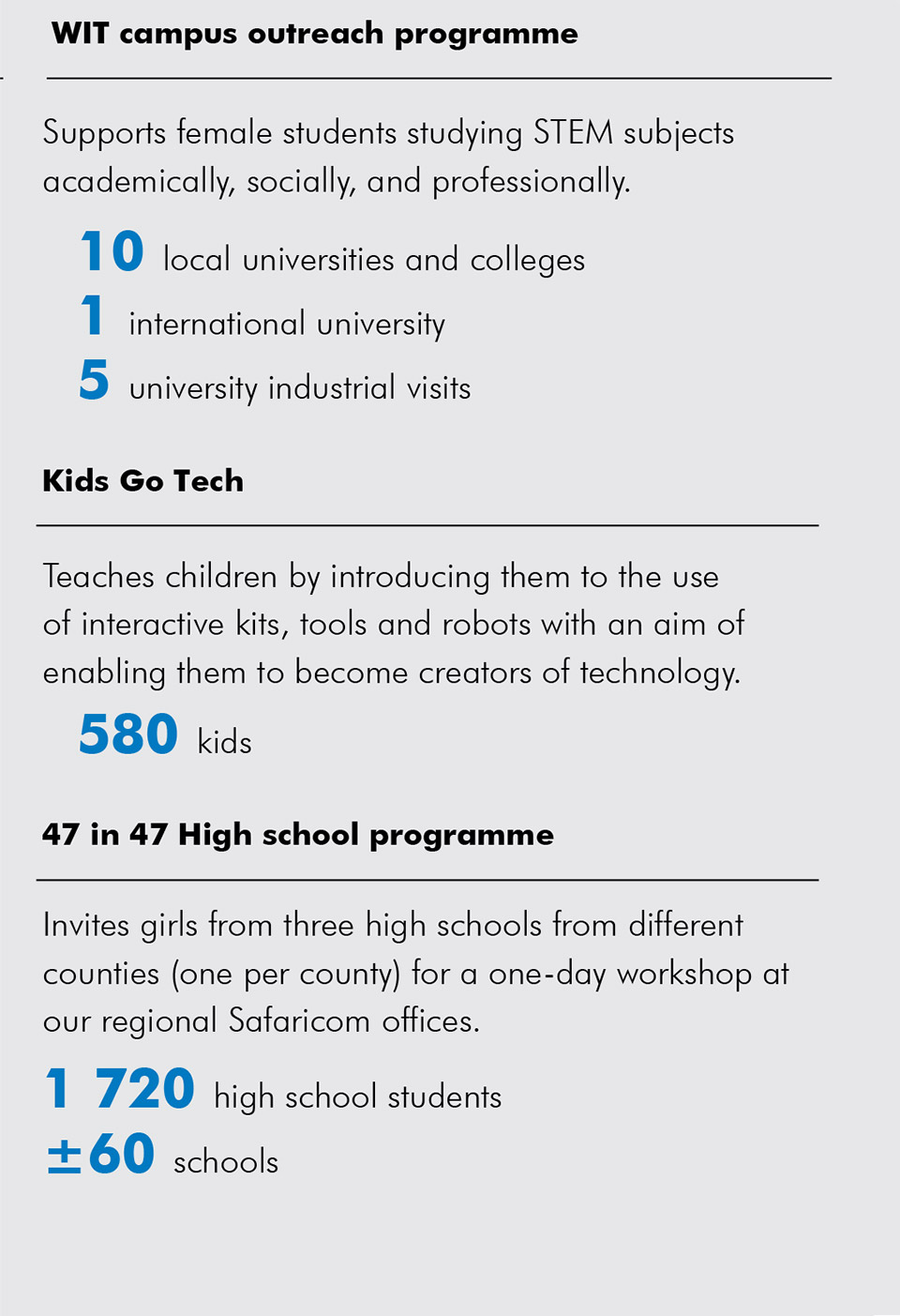
![]() Looking ahead
Looking ahead
- For B Team, our work in 2020 and beyond will focus on growing the group of East African responsible business leaders and deepening existing initiatives and expanding our work to West Africa by building a cohort of responsible business leaders with a specific focus on responsible tax practice and emerging business leaders who are committed to sustainable business practice. We will work in partnership with the Open Society Initiative for West Africa on this. We will also continue to leverage the influencing power of our regional members alongside The B Team Leaders to advocate for ambitious private sector leadership across our agenda, and develop and grow strategic partnerships within Africa and globally that will support the realisation of African-led solutions that address African issues.
- We will continue supporting communities navigating through the challenges created by the COVID-19 pandemic through the Foundations.

